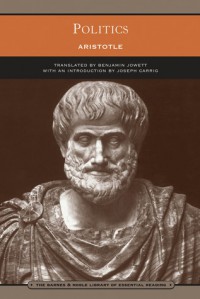Currently reading
Politics

As Plato’s writings have been a cornerstone of Western thought, so have those of his pupil Aristotle through his own lectures and treatise sometimes agreed and disagreed with his teacher while shaping the views of millions over the millennia. Politics is one of the most important political treatise that has impacted society as it is studied alongside Plato’s own Republic not because they agree, but how they agree through different methods and disagree in conclusions.
Unlike the approach of Plato, Aristotle focused on the examples that the Greek political world knew of to determine the best approach for government of a polis. Classifying the types of government into six forms, three “ideal” and three “perverted”, Aristotle described them as showing their pros and cons in an effort to establish the “best”. Then his analysis turned to various functions of government from laws, offices, and how to pass or fill either. Yet, underlying everything is Aristotle’s insistence that human nature determines everything concerned with governance.
Politics, while thought-provoking and significant in its analysis and conclusions, is unfortunately not without its flaws. The biggest is Aristotle’s argument of natural rulers and natural slaves that is so opposite to the way many think today. The next biggest is that fact that the overall work seems like it is not coherently organized or even complete as many aspects that Aristotle says he will cover never appear and he writes about the bringing about his conclusive best government before actually proving what it is, though given his argument that the best government for a polis depends on how its population is constructed.
Aristotle’s Politics is at the same both thought-provoking and maddening especially given the soundness of his analysis and the disorganized state of the overall treatise. Yet it is one of the most important treatise of political thought of the Western world and is significant in political and historical terms as it has been influential for millennia.





 4
4
